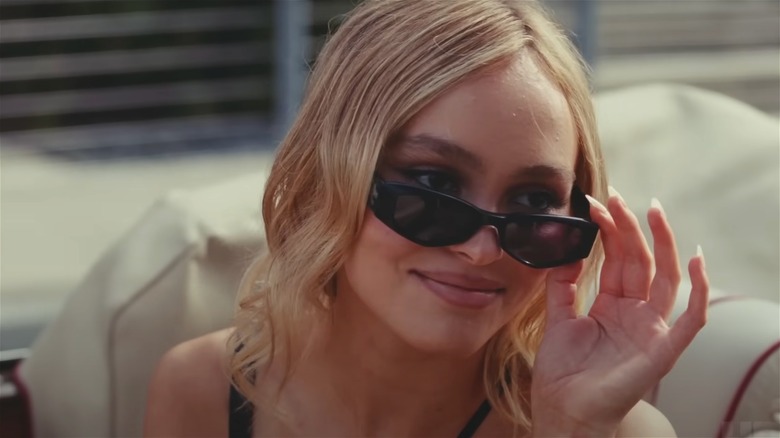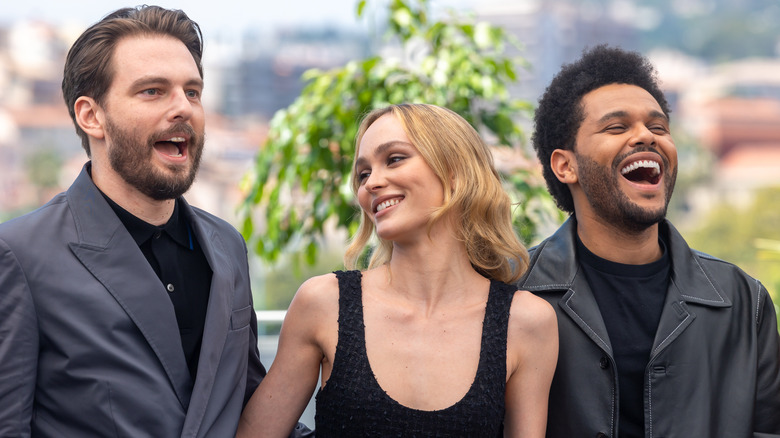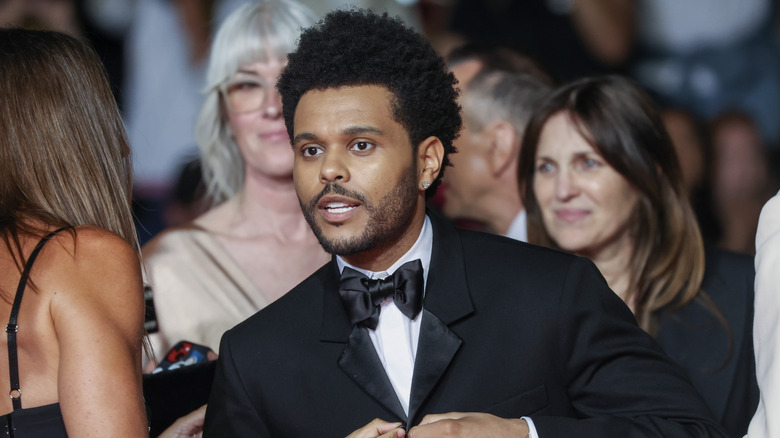What To Know About The Drama Surrounding The Idol Starring Lily-Rose Depp
HBO's "The Idol" was supposed to be "the biggest show of the summer," according to its director, Sam Levinson. Nothing went as planned. The Lily-Rose Depp-led series was officially canceled after just one season and received largely negative reviews (19% rating on Rotten Tomatoes). "The Idol" has been criticized for its gratuitous sexual content, not-so-subtle misogyny, and boring characters.
The story follows Jocylen, a fallen pop star played by Depp, as she attempts to make an industry comeback. Along the way, she gets mixed up with a crusty nightclub owner and part-time cult leader named Tedros (played by Abel "The Weeknd" Tesfaye). What follows is some super cringy dialogue, questionable acting on the part of The Weeknd, and what GQ magazine called "the worst sex scene in history."
Although first drafts of "The Idol" aimed to make fun of toxic aspects of the entertainment industry, the final result looked drastically different ... Especially after Sam Levinson took the lead, replacing the show's original director, Amy Seimetz. "What I signed up for was a dark satire of fame and the fame model in the 21st century," an anonymous production member told Rolling Stone. It originally highlighted "the things that we subject our talent and stars to, the forces that put people in the spotlight, and how that can be manipulated in the post-Trump world." Ultimately, the show morphed from satire into the real thing, according to this source. Still, some of the show's stars tried to put an end to criticism.
Lily-Rose Depp defended The Idol
Sam Levinson, previously known for his work on "Euphoria," was pretty sure his new project would be just as "revolutionary." "The Idol" has certainly been memorable, mostly due to behind-the-scenes drama. In the midst of controversy, Lily-Rose Depp defended the explicit series. "Sam [Levinson] is, for so many reasons, the best director I have ever worked with," the actor told People, a sentiment which she also conveyed to Rolling Stone."Never have I felt more supported or respected in a creative space, my input and opinions more valued ... Working with Sam is a true collaboration in every way," she added. That being said, Depp did have some moments of discomfort with The Weeknd, whose real-life ex-girlfriends include Bella Hadid and Selena Gomez. Sometimes, the lines between the singer and his fictional counterpart, Tedros, were blurry.
The Weeknd, who was also one of the show's co-creators, allegedly drew issue with the "female perspective" the project took under the direction of Amy Seimetz. His opinion likely had something to do with the show's complete creative redirection. In the months leading up to the HBO premiere, the "Blinding Lights" artist called out Rolling Stone's investigation into behind-the-scenes drama, tweeting, "Rolling Stone did we upset you?" and posting a scene from the show poking fun at the publication. Tesfaye still stands by the series. "Continue to push the vision no matter how bumpy the journey," he wrote on his Instagram before the final episode. "Bumpy" is putting it lightly.
The Weeknd doesn't mind controversy
Originally, the script of HBO's "The Idol" focused on Lily-Rose Depp's character, examining the pitfalls of the music industry through a feminist lens. Allegedly, Abel "The Weeknd" Tesfaye wanted Tedros to be more in-frame. "It was like the Weeknd wanted one show that was all about him — Sam [Levinson] was on board with that," an anonymous source told Rolling Stone. As the singer explained to audiences at The Cannes Film Festival, his goal was to "[Create] something special, daring, exciting, fun ... make people laugh, p**s some people off ..." (via ET Canada). He definitely succeeded in the latter.
As for the response to the show? "It's definitely shaken up the culture for sure," laughed The Weeknd in an interview with GQ, admitting that he knew the cast and crew were "making something dark and controversial." He explained that many aspects of the show were intentionally "campy" and exaggerated, especially that infamous sex scene in Episode 2 ... No, it wasn't meant to be taken seriously.
It's clear that plenty of the lower-billed cast and crew members didn't feel the same "family" bond on set that Depp, Levinson, and Tesfaye alluded to at Cannes. "[Amy Seimetz, the original director] put her neck on the line for this project," another unnamed source revealed to Rolling Stone,explaining that Seimetz tried to "fit a square peg into a round hole," only for her work and perspective to be "eradicated" by Levinson.


